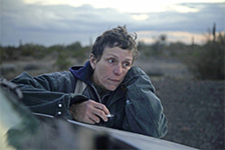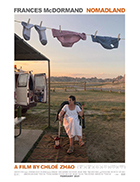Nomadland
|  Chloé Zhao’s Nomadland is an astonishing piece a work—a film that is both simple and profound, a genuine heir to the principled spirit of Italian neorealism. Critic and screenwriter Cesare Zavattini’s 1953 essay “Some Ideas on the Cinema” arguably best encapsulated the aesthetic and moral imperative of neorealism’s cinematic focus on the ordinary and the everyday, and his words feel as if they were written about Nomadland. As Zavattini wrote, “The cinema’s overwhelming desire to see, to analyse, its hunger for reality, is an act of concrete homage towards other people, towards what is happening and existing in the world.” But, as he also noted, a film becomes “spectacular not through its exceptional, but through its normal qualities; it will astonish us by showing so many things that happen every day under our eyes, things we have never noticed before.” And that is precisely what Zhao’s film does—it shows us a world that exists right now and that most of us are probably entirely unaware of. Or, if we are aware, that awareness is distant and academic; this is, we know of it, but we don’t know it. The world of Nomadland, as the title suggests, is that of itinerate Americans—men and women who work and live and provide valuable labor, but purposefully remain unmoored and untethered to permanent home. They move about the country in trucks and vans and RVs, taking on seasonal labor wherever it may be and then moving on when the jobs dry up or the urge to move comes over them. They are not “homeless” per se, but rather live in their vehicles, with all of their belongings inside, travelling from place to place, a way of life that reaches back thousands of years, but in today’s culture and economy is looked own on as evidence of failure, dislocation, and disconnect. Zhao’s film powerfully challenges such preconceptions, showing that this way of life, while not usual by typical American standards, nonetheless has its own culture, its own pleasures, its own dignity. We see the world through the experiences of Fern (Frances McDormand), a woman in her 60s whose otherwise ordinary life is upended in 2011 by the death of her husband and the loss of her job when the US Gypsum plant in Empire, Nevada, shuts down, effectively turning her long-time home into a ghost town. Finding herself suddenly unmoored amid the Great Recession from the two things in life that keep us grounded—family and work—she decides to sell or give away most of her belongings, purchase a used van, and make it her home as she seeks out seasonal work across the country. She becomes involved with a group of like-minded “wheel estate” nomads organized by Bob Wells, a real-life “vandweller” who has long advocated for the nomadic life (she attends the Rubber Tramp Rendezvous, an annual gathering of vandwellers organized by Wells in Quartzsite, Arizona). In this respect, the film blurs the lines between fiction and documentary, which in the neorealist tradition provides a wellspring of authenticity in terms of time and place that is shaped and molded by the vague contours of a traditional narrative. There is no overarching plot in Nomadland, but rather a series of vignettes in which Fern interacts with various nomadic characters, each of whom provides insight and reflection on this chosen life. Her most frequent interactions are with a man named Dave (David Strathairn, the only other professional actor in the film), a widower she met at the Rubber Tramp Rendezvous with whom she develops a tenuous connection. A more conventional film would force them into a soul-reaffirming romance, but Nomadland is not a conventional film, and Zhao, following the neorealist tradition, is not interested in easy answers or pat reassurances. Zhao based the film on journalist Jessica Brunder’s 2017 nonfiction book Nomadland: Surviving America in the Twenty-First Century, although much of the film has an improvised feel that belies tight plot or even structured scenes. Working again with cinematographer Joshua James Richards, who shot her previous two films, Zhao gives Nomadland a paradoxical look that is both rough and at times ethereal. The landscapes are often bleak, especially the abandoned town of Empire in the gray dead of winter, but the people who populate them are so intriguing and engaging and have such a sense of realness to them that the film maintains a sense of life even when things seem to be in despair. Frances McDormand, who purchased the rights to the novel along with producer Peter Spears and approached Zhao about directing the film after seeing her second feature, The Rider (2017), gives a beautiful and nuanced performance as Fern, a woman at a crossroads late in life. Much of the time we simply watch as she goes about her various routines, whether that be the difficulties of living inside a small van, or working in an Amazon fulfillment center, or managing an RV park. She gives an honest, direct, and ego-less performance that gives Fern the rich contours of someone we know, but who still remains at a distance; we are brought into some of the most personal aspects of her life (let’s just say that bathroom issues are a constant problem when you live in a van), yet there is something a bit inscrutable about her because she is in the process of becoming. We don’t think of life changing so dramatically so late in life, yet McDormand’s performance shows us how it, like the film itself, can be both unsettling and beautiful at the same time. Copyright © 2021 James Kendrick Thoughts? E-mail James Kendrick All images copyright © Searchlight Pictures |
Overall Rating: 


 (4)
(4)


